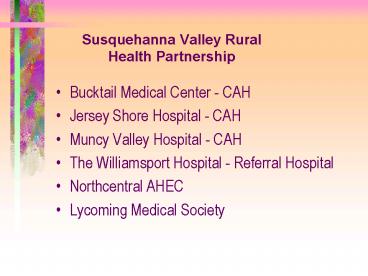Susquehanna Valley Rural Health Partnership - PowerPoint PPT Presentation
1 / 17
Title:
Susquehanna Valley Rural Health Partnership
Description:
The Susquehanna Valley Rural Health Partnership will be a model rural healthcare ... liaison is necessary to secure buy in and act as a main communicating vehicle. ... – PowerPoint PPT presentation
Number of Views:27
Avg rating:3.0/5.0
Title: Susquehanna Valley Rural Health Partnership
1
Susquehanna Valley Rural Health Partnership
- Bucktail Medical Center - CAH
- Jersey Shore Hospital - CAH
- Muncy Valley Hospital - CAH
- The Williamsport Hospital - Referral Hospital
- Northcentral AHEC
- Lycoming Medical Society
2
HISTORY
- Existing relationships
- Incorporated as 501c3 April 2002
- Recipient of 3 year Network Development Grant
(5/03-4/06)
3
Mission Statement
The Susquehanna Valley Rural Health Partnership
is committed through the collaborative leadership
of rural health organizations to facilitate
responsive, high quality compassionate and
cost-effective healthcare services.
4
Vision Statement
The Susquehanna Valley Rural Health Partnership
will be a model rural healthcare network that
will be self-sustaining while enhancing the
viability of its members. This will be achieved
through collaboration and a diversified strategy
to attain financial independence.
5
Principles of Success
- SVRHP will develop a thorough understanding of
the nature and degree of community health care
needs. You can only transform what you own. - SVRHP will remain aware of the degree to which
its membership represents the service area and
how their relationships effect the nature of the
local health care market. Connectivity equals
consciousness. - SVRHP members will devote organizational
resources to the partnership. This includes CEO
attendance to the monthly SVRHP meetings. - SVRHP network relationships/governance are
explicit and binding and - SVRHP is purposeful and follows an explicit plan
of action.
6
Common Challenges
- HIT
- HPSAs/MUAs
- Performance Improvement
7
Partnership Goals
- Develop sustainable Rural Health Network
- Implement a regional HIT system (WAN)
- Lifeline Medical Record
- Digital Medical Library
- Remote decentralized pharmacy system
- CPOE
- Financial systems
- Insure local access to healthcare in region
8
- Achieve economies of scale to support provider
sustainability. - Reallocation of resources to community health
improvement initiatives. - DO NO HARM
9
Workgroups
- Pharmacy
- Compliance/HIPAA
- IT
- Transportation
10
Challenges
- Balance of individual vs. Partnership goals
- Autonomy
- Funding
- Buy-in from medical staff.
11
Success to Date
- PACS (except _at_ BMC)
- Dictation (except _at_ BMC)
- LAN _at_ BMC (fully deployed June 04)
- EMR (except _at_ BMC)
- Financial (except _at_ BMC
12
Lessons Learned
- Collaboration among institutional players and
individual providers is crucial. - The establishment of an on-site liaison is
necessary to secure buy in and act as a main
communicating vehicle. - Spend enough time in the early planning phase to
understand how the technology will impact patient
care practices. Mapping out the new processes
and clearly identifying the roles and
responsibilities for physicians, nurses,
Pharmacists, and administrative staff. - Understand the benefits of implementing the
solution for all parties.
13
- Emphasize the delivery of care or connecting with
patients and providers, not technology. - Proactive training.
- Concurrent feedback and follow-up
- Be prepared for technical difficulties and delays
14
Next Steps
- Remote decentralized pharmacy system
- CPOE
dependent on AHRQ award anticipated start Fall
04
15
Year 1
- JSH - Begin implementation of the medical
management system and enroll in bulk purchasing
of pharmaceuticals. This addresses each of the
disparities, especially resource and clinical. - BMC - Finish installation of core network
infrastructure, which will bring this
organization to relative parity with the other
members. - BMC - Once step 2 is completed, begin
implementation of the medication management
system and enroll in bulk purchasing of
pharmaceuticals.
16
- Year 2
- JSH - Finish implementation of medication
management system. - BMC - Finish implementation of medical
management system. - MVH - Begin implementation of CPOE
17
Year 3
- MVH - Complete implementation of CPOE.
- JSH BMC - Begin implementation of CPOE































